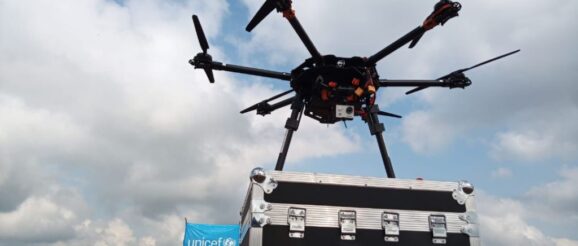The Bill and Melinda Gates Foundation supports Drones in Sierra Leone for medical supply chain innovation – DSTI

On 20th, October 2020, the Bill & Melinda Gates Foundation awarded a grant of $131,130 to the Directorate of Science, Technology and Innovation (DSTI) to support the proposal for the design of a sustainable and cost-effective drone-delivery model for integration into Sierra Leone’s medical supply chain.
This is a supplement to the grant that was previously awarded for the support of The Integrated Geographic Information System (iGIS) Portal, a cross-sectoral spatial data infrastructure and geodatabase.
“When DSTI presented their vision to the Interagency Supplies Group on UAS I was determined to support them. I had been aware of the project from a distance, but it was important to hear the clear articulation of how they planned to work across the different departments of the Sierra Leone Government, and with UNICEF and Crown Agents. Supporting and empowering DSTI helps ensure this is Government-led, that partners selection is consistent with Government procurement protocols and that there is a plan to fund implementation in the medium term that donors can get behind.” David Sarley, Senior Program Officer- Bill & Melinda Gates Foundation.
The National Development plan has as one of its strategic objectives, “to transform the health sector from an under-resourced, ill-equipped, and inadequate delivery system into a well resourced and functioning national health-care delivery system that is affordable for everyone and accessible to all.” Consequently, optimizing the speed, responsiveness and efficiency of the existing medical supply chain, through the use of drones to improves access to essential medical supplies, could be a key factor in influencing that outcome.
As an affordable technological device, a drone has the potential to provide increased access to areas in Sierra Leone previously thought too remote or unnavigable. Drones can complete a trip, in under 90 minutes from a single, central location on a drop-and-return basis. This provides leaders and decision-makers in the Ministry of health and Sanitation (MoHS), the following:
DSTI, in collaboration with the National Medical Supply Agency (NMSA), and their development partners, intend to design a 5-year project to integrate a national drone-based, multi-commodity, medical delivery system in Sierra Leone. This builds on the existing rapport and collaboration with UNICEF Sierra Leone Innovation Office. UNICEF, through the UNICEF Innovation Fund provides resources to quickly assess, fund and scale companies, teams, and ideas that have been developed in new and emerging markets. The Innovation Fund supports the generation of open source, public goods that address the most pressing challenges facing children. It was under this mandate that the collaboration between DSTI and UNICEF SL was forged, leading to the establishment of West Africa’s first Drone / UAV / UAS testing corridor in Sierra Leone in November 2019.
“In Sierra Leone, innovation is not an option. It is our determination to use fourth industrial revolution technologies to solve our most intractable problems. To see our work in drones, advance from idea, to a drone corridor, and now being projected on a flight path is incredible. The day when lives will be saved because of cost-effective national drone delivery mechanisms is upon us in Sierra Leone. With the partnerships being created and led by government, the impact will be transformational.” Dr David Moinina Sengeh, CIO
In line with the objective of developing Sierra Leone’s drone ecosystem organically, the design team will be putting out an expression of interest inviting suppliers to demo multiple use cases and UAV capacity in the corridor to inform the final proposal document. A scholarship would be awarded to the supplier selected using the grant resources.
The Managing Director of the NMSA, Dr Lawrence Sandy, hopes that the introduction of drone technology will support and enhance the timely delivery of critically needed medical commodities such as blood products, and temperature sensitive drugs like oxytocin to remote and hard to reach communities. He continued by saying,
“This would save precious lives, empower our health workforce, and strengthen our healthcare systems. A healthcare system is only as good as having the ability to deliver critically needed life-saving products at service delivery points to treat, prevent and reduce disease burden on individuals and communities. As a nation, we’ve made significant strides over the last two years to optimize our drug distribution systems. We are with a strong view that this innovation will reduce our maternal and child mortality and morbidity, improve health outcomes and strengthen our supply chain into a more resilient outfit. We look forward to a fostered partnership and close collaboration on this national drone project.”
To make any inquiries, send an email to [email protected]
